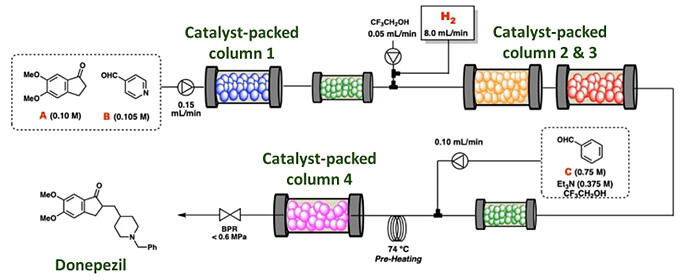A research group led by Professor Shu Kobayashi and Project Professor Haruro Ishitani of the Graduate School of Science at the University of Tokyo has demonstrated the concept of environmentally friendly chemical production based on chemical transformation using hydrogen via the sequential synthesis of the anti-Alzheimer's drug donepezil. In the production of chemicals, many reaction reagents are used, and most are disposed of as coproducts. In this study, the research group used chemical transformations using hydrogen as a reaction reagent to realize environmentally friendly synthesis, with water as the sole byproduct. As a model case, this study is expected to promote further development of environmentally friendly production of chemicals. This work was published in Chemistry, A European Journal.

By pumping raw materials A, B and C and the reactant hydrogen into four catalytic column reactors, the topmost raw material is converted to donepezil without any intermediate operations in between.
Provided by the University of Tokyo
Since organic compounds are made of carbon and hydrogen, hydrogen is an important component of them and one of the raw materials required for their production. In the current fossil resource-dependent production of chemicals, the introduction of oxygen and other elements from crude oil, which is composed mainly of carbon and hydrogen, is important. Meanwhile, recycling-oriented production of chemicals using renewable carbon sources, such as biomass and carbon dioxide, without relying on fossil resources requires a paradigm shift to a chemical reaction system in which the desired structures are constructed by introducing hydrogen into biomass and other carbon sources containing high percentages of oxygen.
As a result of this, organic compound synthesis methods using hydrogen as a raw material constitute the backbone of chemical production in a hydrogen society and are expected to become even more important in the future. It would be ideal if a production system with water as a sole byproduct could be created.
In this study, the research group demonstrated this concept by using the synthesis of donepezil, a precursor for an anti-Alzheimer's drug, as a model case. This approach has the new advantage of using less expensive raw materials as starting materials, but it requires more difficult catalytic chemical transformations. They achieved this by developing a high-performance immobilized metal catalyst and incorporating it into a continuous-flow system. Furthermore, the ultimate goal of this study was to connect multiple continuous-flow systems in series and complete transformations from raw materials to final products by a one-flow synthesis in a sequential flow system without isolation and separation of intermediates and coproducts. Although many unforeseen barriers exist, an ideal chemical production configuration could be created by combining appropriate continuous processing methods.
This study demonstrated the concept of environmentally friendly chemical production using hydrogen by combining appropriate reaction design with superior catalysts.
Journal Information
Publication: Chemistry, A European Journal
Title: Sequential-Flow Synthesis of Donepezil: A Green and Sustainable Strategy Featuring Heterogeneous Catalysis and Hydrogenation
DOI: 10.1002/chem.202402128
This article has been translated by JST with permission from The Science News Ltd. (https://sci-news.co.jp/). Unauthorized reproduction of the article and photographs is prohibited.




